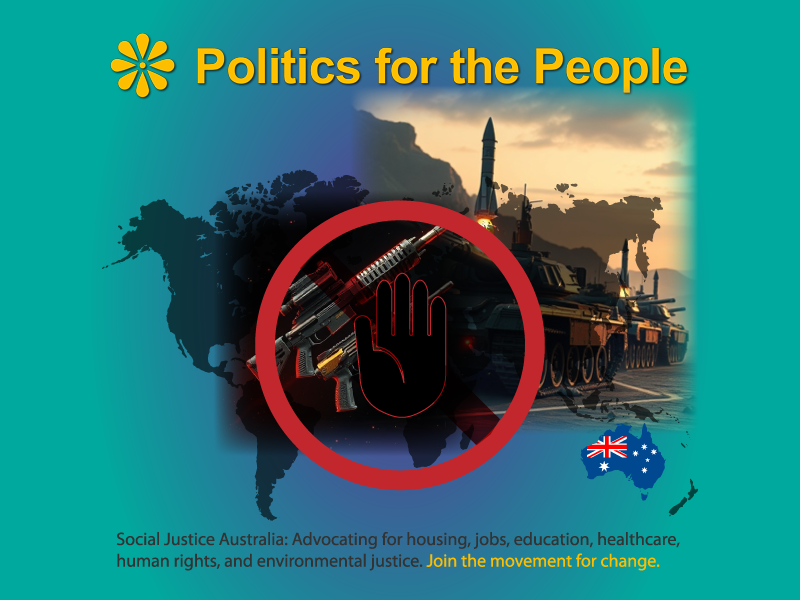Introduction
Historically, using war as a distraction has been strategically employed to divert attention from domestic problems, uniting people under a common cause. This article delves into the dangerous implications of war as a distraction tactic and underscores the need for global collaboration in solving contemporary challenges.
The Cynical Strategy of War for Distraction
Historical Precedents

The phrase “When in doubt, start a war, and the mugs will rally around the flag,” attributed to figures like Georges Clemenceau and H.L. Mencken, encapsulates a cynical use of war as a political tool. Throughout history, leaders have used conflict to divert attention from internal issues and consolidate power. Examples include the Falklands War during Margaret Thatcher’s tenure and the invasion of Iraq under George W. Bush. These conflicts were seen as rallying points for national unity, masking underlying issues such as economic troubles or political scandals.
Effects on Society
While war can temporarily unite a nation, its long-term effects on society are often devastating. War leads to loss of life, displacement of populations, and destruction of infrastructure. The human cost of war is immeasurable, with families torn apart and communities shattered. Furthermore, the financial cost of war can cripple economies for generations, diverting resources from essential services like healthcare and education.
The High Cost of War
Economic Impact
Wars are incredibly costly, not only in terms of lives lost but also financially. The resources spent on war efforts could be more effectively used in addressing underlying issues like poverty, inequality, and environmental challenges. The opportunity cost of war is immense, with funds that could be invested in infrastructure, education, and healthcare being diverted to military expenditures.
Environmental Consequences
War also has severe environmental consequences, with the use of weapons and destruction of infrastructure leading to pollution and habitat destruction. The long-term environmental impact of war can persist for decades, affecting ecosystems and human health.
Lessons from the COVID-19 Pandemic
Global Cooperation
The COVID-19 pandemic exemplifies the necessity for global cooperation in crisis management. As the virus affected the entire world, it became clear that no single nation could combat the pandemic alone. This situation called for a unified global response, highlighting the importance of collaboration over isolationism. The pandemic has shown that global challenges require global solutions, and that cooperation is key to overcoming them.
Healthcare Systems
The pandemic has also exposed weaknesses in healthcare systems around the world. Countries with strong healthcare infrastructure and robust public health measures have fared better in managing the crisis. This highlights the importance of investing in healthcare and strengthening healthcare systems to better prepare for future crises.
The Pitfalls of Isolationism and Protectionism
Global Interconnectedness
Despite the need for global unity, some nations have reverted to isolationist and protectionist policies, reminiscent of 19th-century geopolitics. This approach is counterproductive in a world where interconnectedness and collective action are crucial for addressing large-scale crises. Isolationist policies can lead to increased tensions between nations and hinder efforts to address global challenges collectively.
Economic Consequences
Isolationism and protectionism can also have severe economic consequences, leading to trade wars and economic downturns. In an interconnected world, where economies are interdependent, such policies can have far-reaching effects, leading to job losses and economic instability.
Embracing Global Cooperation for Modern Challenges
Collaborative Solutions

Addressing today’s global crises demands a concerted effort from all nations. Leaders must prioritize collaboration, investing in science, technology, and setting up new global partnerships. This unified approach is essential for tackling the complex challenges of the 21st century. Issues such as climate change, pandemics, and terrorism require global solutions, and cooperation is key to finding them.
Sustainable Development Goals
The United Nations’ Sustainable Development Goals (SDGs) provide a framework for global cooperation and action. The SDGs aim to address a range of issues, including poverty, inequality, climate change, and peace and justice. Achieving these goals requires cooperation between governments, businesses, and civil society, highlighting the importance of working together to build a better future for all.
Rejecting War, Embracing Unity
A Call for Peace
In conclusion, war is an ineffective and harmful response to modern crises. We must move beyond outdated tactics of conflict and embrace a strategy of global cooperation and unity. Only through collective efforts can we hope to resolve the complex issues facing our world today. By rejecting war and embracing unity, we can build a more peaceful and prosperous future for all.
Question for Readers
Do you believe that global cooperation can effectively replace conflict in solving world issues?
Call to Action
Join the conversation and advocate for peace and unity in addressing global challenges.
References:
Blaming it on NATO? Framing the role of NATO in the full-scale Russian invasion of Ukraine on Twitter : https://www.frontiersin.org/articles/10.3389/fpos.2023.1122439
The Ukraine effect: demise or rebirth of the global order?: https://www.lowyinstitute.org/publications/ukraine-effect-demise-or-rebirth-global-order
Just War Theory: https://iep.utm.edu/justwar/
Brereton, Paul — “The International Law of Armed Conflict: http://classic.austlii.edu.au/au/journals/JCULawRw/2021/2.html
War rights and military virtues: A philosophical re-appraisal of Just War Theory: https://researchonline.nd.edu.au/cgi/viewcontent.cgi?article=1100&context=theses

